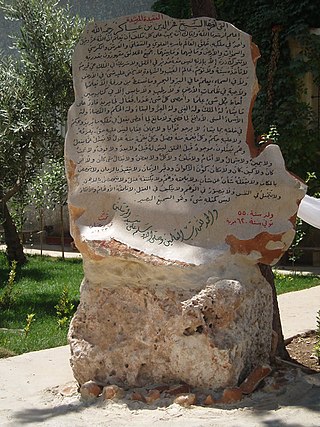Top Qs
Timeline
Chat
Perspective
Muhammad al-'Arabi al-Tabbani
Algerian Sunni Muslim scholar From Wikipedia, the free encyclopedia
Remove ads
Muhammad al-'Arabi al-Tabbani (Arabic: محمد العربي التبّاني; 1897–1970),[7] also known as Abu Hamid ibn Marzuq (Arabic: أبو حامد بن مرزوق)[8] was an Algerian Maliki jurist (faqih), Ash'ari theologian, Hadith scholar (muhaddith), historian (mu'arrikh), and a genealogist (nassāba), who was the Imam of the Great Mosque in Mecca in his time.[9][10][11]
He is considered one of the most prominent hadith scholars of his era;[1] and he is perhaps best known for his criticism of Wahhabism/Salafism,[12][13] as found in his book entitled, Bara'at al-Ash'ariyyin min 'Aqa'id al-Mukhalifin (English: The Innocence/Dissociation of the Ash'aris from the Doctrines of the Dissenters/Opponents).[14]
His name 'al-Tabbani' is derived from the town and commune of Ouled Tebben.[15]
Remove ads
Birth
He was born in Ras el-Oued in 1315 AH/1897 AD.[1][16]
Lineage
His lineage reaches back to 'Abd al-Salam b. Mashish (d. 625/1228), whose lineage ends with al-Hasan b. 'Ali b. Abi Talib (d. 49/669).[16]
Teachers
He studied under many scholars, among them are:[9][17]
- 'Abd al-Hamid ibn Badis.
- Yusuf al-Nabhani.
- Muhammad Bakhit al-Muti'i.
- Muhammad ibn Ja'far al-Kattani.
- Muhammad al-Makki ibn 'Azuz.
- Hamdan ibn Ahmad al-Wanisi.
- Ahmad ibn al-Khayyat al-Zakari.
- Mushtaq Ahmad al-Hindi.
Students
Among his celebrated students are:[9][18]
- 'Alawi ibn 'Abbas al-Maliki and his son Muhammad 'Alawi al-Maliki.
- 'Abdullah al-Harari.[5]
- Muhammad Nur Saif.
- Hasan al-Mashshat.
- 'Abdullah b. Sa'id al-Lahji.
- Muhammad Amin Kutbi.
- 'Abd al-Qadir b. Ahmad al-Jaza'iri.
Works
Among his books are the following:[3][14][19]
- Bara'at al-Ash'ariyyin min 'Aqa'id al-Mukhalifin (Arabic: براءة الأشعريين من عقائد المخالفين, lit. 'The Innocence/Dissociation of the Ash'aris from the Doctrines of the Dissenters/Opponents'). In this book, he criticized the doctrinal views advocated by Ibn Taymiyya (d. 728/1328) and his student Ibn al-Qayyim (d. 751/1350), and Muhammad ibn 'Abd al-Wahhab (d. 1207/1792) and his followers.
- Al-Ta'aqqub al-Mufid 'ala Hadyy al-Zar'i al-Shadid (Arabic: التعقب المفيد على هدي الزرعي الشديد). In this book, he criticized Ibn al-Qayyim's book Zad al-Ma'ad.
- Tahzir al-'Abqari min Muhadarat al-Khudari (Arabic: تحذير العبقري من محاضرات الخضري). In this book, he criticized the Egyptian legal historian Muhammad al-Khudari (d. 1345/1927).
Remove ads
Death
He died in 1390 AH/1970 AD in Mecca and was buried in Jannat al-Mu'alla cemetery, next to the tomb of Asma' bint Abi Bakr (d. 73/692).[9][19]
See also
Arabic Wikisource has original text related to this article:
References
External links
Wikiwand - on
Seamless Wikipedia browsing. On steroids.
Remove ads
